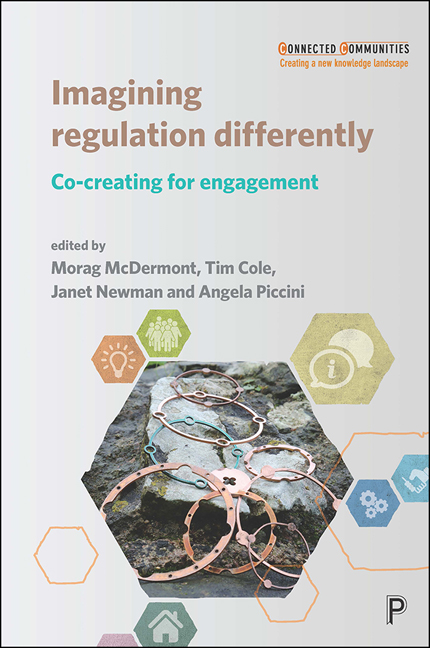Book contents
- Frontmatter
- Dedication
- Contents
- List of Figures, Tables and Boxes
- List of Abbreviations and Acronyms
- Notes on Contributors
- Acknowledgements
- Series Editors’ Foreword
- 1 Introduction: From the Regulation of Engagement to Regulating for Engagement
- 2 Co-Production as Experimentation: the Research Forum as Method
- Interlude: Community Researchers and Community Researcher Training
- 3 Beyond Prevent: Muslim Engagement in city Governance 49
- 4 Regulating for ‘care-ful’ knowledge Production: Researching Older People, Isolation and Loneliness
- 5 Who Gets to Decide what’s in my Fridge? Principles for Transforming the ‘Invisible Rules’ Shaping the Regulation of Food Habits in Urban Spaces
- 6 Life Chances: Thinking with art to Generate new Understandings of Low-Income Situations
- 7 The Making, Mapping and Mobilising in Merthyr Project: Young People, Research and arts Activisms in a Post-Industrial Place
- 8 Regulating Engagement Through Dissent
- 9 The role of Community Anchor Organisations in Regulating for Engagement in a Devolved Government Setting
- 10 Conclusion: Towards an Organic model of Regulating for Engagement
- Postscript: Engaging the University?
- References
- Index
6 - Life Chances: Thinking with art to Generate new Understandings of Low-Income Situations
Published online by Cambridge University Press: 03 March 2021
- Frontmatter
- Dedication
- Contents
- List of Figures, Tables and Boxes
- List of Abbreviations and Acronyms
- Notes on Contributors
- Acknowledgements
- Series Editors’ Foreword
- 1 Introduction: From the Regulation of Engagement to Regulating for Engagement
- 2 Co-Production as Experimentation: the Research Forum as Method
- Interlude: Community Researchers and Community Researcher Training
- 3 Beyond Prevent: Muslim Engagement in city Governance 49
- 4 Regulating for ‘care-ful’ knowledge Production: Researching Older People, Isolation and Loneliness
- 5 Who Gets to Decide what’s in my Fridge? Principles for Transforming the ‘Invisible Rules’ Shaping the Regulation of Food Habits in Urban Spaces
- 6 Life Chances: Thinking with art to Generate new Understandings of Low-Income Situations
- 7 The Making, Mapping and Mobilising in Merthyr Project: Young People, Research and arts Activisms in a Post-Industrial Place
- 8 Regulating Engagement Through Dissent
- 9 The role of Community Anchor Organisations in Regulating for Engagement in a Devolved Government Setting
- 10 Conclusion: Towards an Organic model of Regulating for Engagement
- Postscript: Engaging the University?
- References
- Index
Summary
Introduction
In what ways do regulatory regimes enact, delimit and inhibit the progress of families on low incomes across England and Wales? Although they may not explicitly interact, diverse regimes are affectively experienced, including immigration status (including from European Union [EU] countries), employment assessments and activation, mental health, child protection, structural and overt racism, and the nonportability of professional qualifications across national systems. In this chapter, we explore how contemporary social practice art materialises these intersections and enables disruptions of regulatory regimes in ways not possible using traditional social science approaches. We focus on a research team that included artists Close and Remote, and explain how the team co-produced, with community members and academics, a socially engaged artwork – Life Chances – that aimed to generate new knowledges about the regulatory regimes that low-income families with children experience. Aiming towards what sociologist Yasmin Gunaratnam (2012) describes as a form of improvisational empathy, Life Chances worked with Thomas More's (1516) Utopia and Ruth Levitas's (2013) Utopia as Method as ‘a form of speculative sociology of the future’ (Levitas, 2013: 85). By staging and troubling contradictory notions of ‘life chances’ through art, we specifically ask how the regulatory services that families encounter in two urban settings – the Easton area of Bristol and Butetown, Riverside and Grangetown in Cardiff – shape, constrain and enable the life chances of individual families and communities, or what Pierre Bourdieu (1977) refers to as doxa, and how these services might be ‘otherwise’.
Life Chances was co-designed by academics from Bristol and Cardiff Universities, artists Close and Remote, and two community organisations: the Single Parent Action Network (SPAN) in Bristol and South Riverside Community Development Centre (SRCDC) in Cardiff. From the outset, there was an intention to work with social practice art. In addition to its emphasis on collaborative working closely reflecting the principles of co-production, we wanted to work with the everyday materials that families on low incomes encounter. Moreover, we were interested in working with a creative practice that would manifest the distributed, entangled and durational relationships across diverse regulatory regimes.
- Type
- Chapter
- Information
- Imagining Regulation DifferentlyCo-creating for Engagement, pp. 105 - 126Publisher: Bristol University PressPrint publication year: 2020



